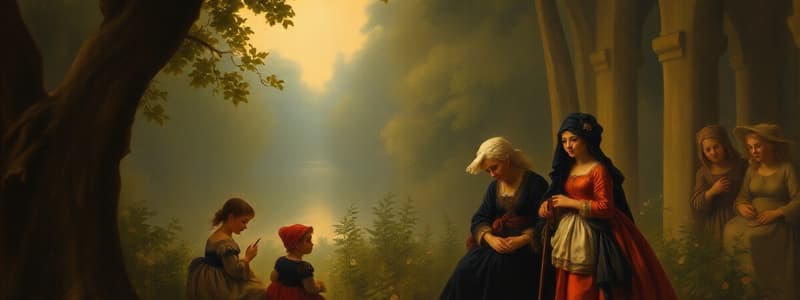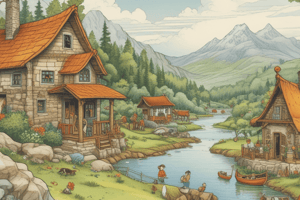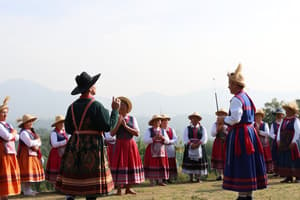Podcast
Questions and Answers
Define folklore in a single sentence, according to the text.
Define folklore in a single sentence, according to the text.
Folklore is our cultural DNA.
Name three examples of topics folklorists actively study in society.
Name three examples of topics folklorists actively study in society.
Education, healthcare, poverty, and immigration.
Give two examples of how folklore is transmitted, according to the text.
Give two examples of how folklore is transmitted, according to the text.
Oral communication and by example.
List three types of traditions that fall under the umbrella of folklore.
List three types of traditions that fall under the umbrella of folklore.
What role does folklore play in how we understand the world?
What role does folklore play in how we understand the world?
How does the text define folklore's role in 'the United States'?
How does the text define folklore's role in 'the United States'?
Why is folklore considered a fundamental part of what is means to be human?
Why is folklore considered a fundamental part of what is means to be human?
Name at least five topics covered by folklore mentioned in the text that are prevalent in today's society.
Name at least five topics covered by folklore mentioned in the text that are prevalent in today's society.
How does folklore contribute to societal norms?
How does folklore contribute to societal norms?
The text states that "Folklore is one of the many ways we share with each other the things we see as vital and important." Can you infer and provide three specific examples of 'things we see as vital and important' that might be shared through folklore?
The text states that "Folklore is one of the many ways we share with each other the things we see as vital and important." Can you infer and provide three specific examples of 'things we see as vital and important' that might be shared through folklore?
Flashcards
What is folklore?
What is folklore?
The cultural DNA encompassing the art, stories, knowledge, and practices of a people.
How is folklore preserved?
How is folklore preserved?
Bound in memory and histories; tied to vibrant living traditions and creative expression.
Folklore's role in life?
Folklore's role in life?
A central, everyday aspect of life that helps us make sense of the world.
Folklore's scope?
Folklore's scope?
Signup and view all the flashcards
Folk traditions include?
Folk traditions include?
Signup and view all the flashcards
Folklore's function?
Folklore's function?
Signup and view all the flashcards
Study Notes
Folklore Defined
- Folklore is a group's cultural DNA
- Folklore includes the art, stories, knowledge, and practices of a people
- Folklore can be preserved in memory and histories
- Folklore is tied to living traditions and creative expression
Folklore in the United States
- Folklore is often perceived as untrue or outdated in the U.S.
- Folklore is a vital way of sharing important things with each other.
- It's a central part of daily life and how people understand the world.
- Folklore exists at the core of all cultures, regardless of what people call their own culture
- It's fundamental to being human.
Folklore Topics and Folklorists
- Folklore covers diverse topics, including issues in the news
- Examples of topics include fake news, cryptozoology, legends, holidays, internet memes, traditional music, world music, and the supernatural
- Folklorists study various areas of society, such as education, healthcare, poverty, and immigration
Folk Traditions
- Folk traditions are learned primarily through oral communication and example
- Examples of folk traditions:
- Beliefs, such as religious customs, creation myths, and healing charms
- Practices like dancing, making music, and sewing clothing
- Knowledge, such as building an irrigation dam, nursing an ailment and preparing barbecue
- Creations such as architecture, art, craft, and music
- Stories, riddles, and song lyrics
Purpose of Folklore
- Folklore asserts group identity, challenges cultural norms, and gives examples for ways of living a good life
Studying That Suits You
Use AI to generate personalized quizzes and flashcards to suit your learning preferences.
Related Documents
Description
Explore the essence of folklore as a culture's DNA, encompassing art, stories, and practices. Discover its vital role in sharing knowledge, connecting to traditions, and understanding the world, exemplified by topics like cryptozoology, memes and music. Folklorists study folklore in education, healthcare, poverty, and immigration.




